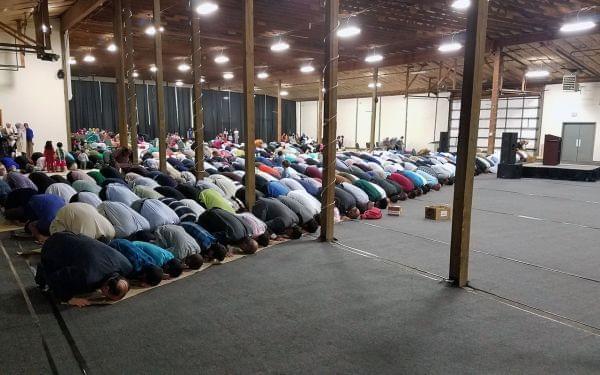Illinois Muslims Relieved That Eid Celebrations Not Falling On 9/11 This Year

Morning prayers area held at the Fluid Events Center in Urbana on Monday September 12, 2016. Abrar Al-Heeti for Illinois Public Media
Muslims across the country on Monday celebrate the holiday of Eid Al-Adha. The day marks the end of the annual pilgrimage to Mecca, the holiest site in Islam. The date came as a relief to many American Muslims. This year, Eid almost fell on Sept. 11th, a date that weighs heavily on many Muslims.
Muslims use the lunar calendar to set the date for Eid Al-Adha. And Ousmane Sawadogo, imam of the Central Illinois Mosque and Islamic Center in Urbana, says the date for this year's celebration was projected to fall on Sept. 11. He says many Muslims worried how that might be perceived.
“So they may say, ‘Yeah, that person was right; look, they’re celebrating.’ So this was one of the fears. But thank God the calendar is confirmed now that it won’t be on Sept. 11.”
The date for Eid Al-Adha is determined by the sighting of a new moon in Saudi Arabia, where Mecca is located. The moon was sighted one day later than expected, so Eid is slated for Sept. 12, not the 11th.
University of Illinois student Bana Zayyad says that could still be a problem for Muslims. "It’s not going to be easy to say the holiday fell on 9/12."
Zayyad was in first grade when the World Trade Center was destroyed. She's Muslim-American, and says growing up in the years after 9/11, the narrative about her religion and its followers cast a shadow on how she viewed herself and her place in society. "Imagine like the age of 6, 7, and feeling like the entire nation’s turned against you," she says. "It does stuff to you, it does stuff to your self-esteem, to the way you perceive yourself, the way you try to connect with your own identity.”
Zayyad, now president of the Muslim Students Association at the U of I, says she felt like she needed to hide as a young Muslim because she feared being targeted.
“I think that throughout those challenges, I built my character, and I think that a lot of other Muslims have built their character to be strong, to be strong-minded," she says. "But in essence, there’s always that fear in the back of my mind that it’s going to catch up with me. And that’s super unfortunate that should be the case.”
Imam Sawadogo says the best way to change people’s attitudes is through education. He emphasizes that even though Eid is a Muslim holiday, it is also an interfaith celebration, since many of this year's rituals commemorate Abraham, who has connections to other faiths, too. “We see Judaism in Ibrahim, we see Christianity in Ibrahim. So this Eid is a way for us to connect with other faiths, the faiths before us."
With Eid falling on Sept. 12, Zayyad says she's relieved that she won’t have to face the backlash of celebrating a Muslim holiday on the anniversary of 9/11. But she knows she’ll probably have to deal with stereotypes the rest of her life.“I still practice my Islam, I still practice my Islam outwardly as well," she says. "I don’t try to be dictated by people who try to push me in a corner through fear.”
And as president of the Muslim Students Association, she also wants to educate others about Islam. The organization is planning Islam Awareness Week in the beginning of October.
Links
- East-Central Illinois Ceremonies Mark 15th Anniversary Of 9-11 Attacks
- Breaking The Ramadan Fast At The Central Illinois Mosque And Islamic Center
- Decatur Muslims Feel Accepted By Their Neighbors, But Voice Concerns Over Political Rhetoric
- Muslim Students Confront Stereotypes
- Being Muslim In Illinois

